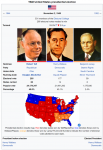New Jerusalem or New Babylon?
The 1947 United Kingdom General Election
 (Wikibox Credit goes to @Oppo )
(Wikibox Credit goes to @Oppo )
The 1947 General Election represented a number of things, the end of nearly 15 years of Labour in office and of 13 years of Morrison, the beginning of Anthony Eden’s time as Prime Minister, the beginning of Democratic Labour’s decline and of the Liberal’s beginning there slow road back to recovery.
Much of the setting for the 1947 election could be placed back at the end of the 1945 election, in which despite having been Prime Minister for a Decade, Herbert Morrison used his substantial popularity as the ‘War Prime Minister’ to launch an election campaign hoping to gain another substantial majority (having won a landslide in 1936 over the back of a split parliament and the abdication crisis).
With Duff Cooper being particularly uninspiring and the Liberals squabbling about how to go forward (with Sinclair’s Fiscal Dryness clashing with the Beveridge supporters) it seemed like Morrison was going to gain another decent majority.
But he had to contend with another raising political party, Democratic Labour.
A coalition of Democratic Socialist Monetary Reformers, the party has formed in the wake of Morrison’s Early 1939 ‘purge’ of Perceived Radical Left MPs, with the charismatic former minister and prominent Monetary Reformer Oliver Baldwin gaining support from a number of CLPs, MPs, Trade Unions and the ILP who joined the party as member of it’s caucus. With about 13 MPs it prepared for the ensuing thunderstorm of a 1939 election...and then World War 2 happened.
Being a mixture of Pacifists and Anti-Fascists meant that the Democratic Labour Party decided to not join Morrison’s War Government but instead offer ‘constructive criticism’. This allowed Democratic Labour to become the voice of the ‘toiling workers’ fighting the war and an anti-establishment Populism took hold as it took part in several By-Elections during the war (causing the party to raise to about 17 MPs) and became the face of those who felt under appreciated during the War. The 1945 election would reflect this as Democratic Labour (campaigning on a fully fledged Beveridge Plan and Industrial Democracy) would gain five additional seats and prove enough of a substantial vote splitter to lead to Morrison only gaining a five seat majority in the end.
Discussions of a possible leadership coup by Ernest Bevin or Oswald Mosley as a preempt to a Labour-Democratic Labour Confidence & Supply Deal would turn out to be for nought as Morrison ruthlessly clamped down on any opposition within the Labour Party and strove to ensure that he reminded Labour Leader and Prime Minister.
Whilst this was happening, Duff Cooper would be pushed aside by the Magic Circle, disappointed in him not seizing the opportunity that Democratic Labour offered him and he would be replaced by the dynamic Moderniser, Anthony Eden. Eden, a former follower of Noel Skelton decided that the only thing to battle Herbert Morrison’s Fabian, Autocratic, Technocratic Socialism was Liberalising, Mutualistic Christian Democracy of sorts. Meanwhile Oliver Baldwin stayed on, positioning the Democratic Labour party as a future Kingmaker down to organising a ‘Shadow Cabinet’ and pursuing an aggressive campaign against Conservative and Labour.
As 1945 and 46 rolled on, Morrison’s position looked barely stable, though many guessed that Labour would last to at least 1949/50 as Morrison and his Whips kept ruthless discipline within the Government. Then the Winter of 47 hit, the coldest winter to hit Britain in generations, shortages of food, raw materials and fuel would grind Britain to a stand still as factories closed and blackouts imposed. Morrison’s Cabinet would be split in how to deal with the situation, with many hoping for support from the Americans.
But the Government of William O. Douglas wasn’t as interested in helping Morrison as Roosevelt had been and potential loans were declined. As his government dealt with the problems of a fuel crisis, Morrison would be dealt with another blow.
Oswald Mosley had once been seen as the future of the Left, but his leadership challenge in 1934 had damaged relations and his cowering acceptance of Morrison after that had lead to the Labour Left gravitating towards Baldwin instead. As the Minster of Labour and Works he became the face of the War Effort at home, being seen as more popular than Morrison in some circles. This combined with frequent visits to the Soviet Union during the War to see how they ran there industries would lead to Mosley becoming Morrison’s resident Stalinist.
In Early March 1947, Mosley would propose asking the Soviet Union for support and when this proposal quickly got him demoted from Cabinet he staged a leadership challenge, which went nowhere and was quickly crushed. Seeing the writing on the wall, Mosley split from Labour with fellow MP and supporter, John Platt-Mills and created the Independent Labour Group which enter into an electoral alliance with the CPGB. By Early June, Morrison’s Majority was on the edge, unpopular and with his own party rebelling the Commons would put his Government to a vote of No Confidence.
Morrison was hopeful, but a miscounting of several Labour MPs by the Whips would lead to Morrison failing the vote and an election forecast to occur in Early Spring.
Eden and Baldwin were happy that would make gains, whilst Morrison was perturbed but hopeful that he could pull off another win.
The Election was a rather bitter affair, Eden taking much of Lord Woolton’s advice to heart and painting himself as the Anti-Socialist candidate, promoting ‘British Values, Over The Un-British Fabianism’ of Morrison, and placing himself as both a more Radical candidate than Morrison (supporting much of the Beveridge Plan in his speeches) whilst also using his Shadow Chancellor Oliver Lyttelton as the man who clamp down on Morrison’s wasteful spending on pet projects like the Empire Fair or his rejuvenation of London City Transport and ensure it went to the people who needed it most (whilst also presenting a business friendly face to the Social Market reforms proposed).
Morrison spent more time attacking Democratic Labour than the Tories, accusing them of being Communist plotters and being friends of Stalin. Democratic Labour also suffered from an inability to revive there message for a different year, much of there thunder being consumed by Eden’s Populist Reformism. Combined with the Beaverbrook Press mercilessly attacking the Democratic Labour Party and Oliver Baldwin himself (with attempts to out right out Baldwin as a homosexual being quashed by Eden who wanted to keep Stanley Baldwin on side during the campaign). Additionally, the Democratic Labour plans for the economy would be put under more scrutiny with there economics spokesman, Norman Smith crudely interjections when critiqued about the parties opposition to Bretton-Woods and using Social Credit to help fund house building making him and the party look foolish and untrustworthy with money to many.
Morrison was attacked from all angles, and spent much of his campaign lashing out at all perceived enemies whilst also engaging in a racist campaign of ‘Keep Britain White’ feeding on the the xenophobia which had been bubbling up in the aftermath of World War 2 in reaction to Afro-Caribbean workers coming to Britain. This left a bad taste in the mouth for many, with a number of potential voters turning away to the Conservative’s instead (who ran on a policy of quotas and limited immigration for ‘desirable’ Workers).
The Liberals came back into there stride, as Tom Horabin (who had taken over after Sinclair’s Stroke in 1946) decided to take some of Democratic Labour's clothes and campaign as the voice of ‘Progressive, Sensible Values’ which appeal to some voters turned off by Labour’s age and Democratic Labour’s Radicalism. The Liberals managed to halt there decline seen in previous years and throw off any connections to the War Government.
Meanwhile the ILG-CPGB alliance was mainly consumed with protecting it’s few seats from being rejected by Labour candidates, with it’s Left Wing potential still being eclipsed by Democratic Labour (which allowed it to build a base in a few areas of the country put off by the ideas of Social Credit and fond of Communism.)
In the end, it would be a wash for Eden who managed to bludgeon his way to a 70 seat landslide, proclaiming in one of the first televised Prime Minister’s addresses that ‘Now We Shall Build A New Jerusalem‘ as his mantra for Government. His Government would be lauded for his efforts on the Home Front (helped by the Douglas Government finally ponying up cash for Western Europe to rebuild with) though overseas would see more mixed results.
Morrison would stubbornly refuse to resign as leader, staying on until June 1949 when fed up with declining poll numbers and his autocratic way, former ally Manny Shillwell would orchestra a leadership coup with the help from the PLP and Trade Unions to push forward the Young Left Winger Alfred Robens into the Leadership chair causing Morrison to be cast into the wilderness of the Lords.
Democratic Labour would only lose 2 seats, despite the drubbing and some in the party saw it as a win, claiming there place as the rightful Third Party of Britain. But Baldwin was tired, and would soon after the election suffer a heart attack. Whilst he wouldn’t die, Baldwin decided that frontline politics was no longer the place to be, in the end he would accept the offer to take his fathers place in the House of Lords and enjoy twenty years as an amusing political character and campaigner against Racial Injustice, Imperialism and Gay Rights before his death. The ensuing leadership battle between Richard Acland, Norman Smith and Konni Zilliacus would be a tedious affair that would lead to splits in the party that would be reaped by Labour in the 1951 election as Norman Smith decided to lean fully into Left Wing Social Credit.
Tom Horabin had managed to stabilise a declining Liberals, his position secure and with a message that resonated with disaffected former Labour and Democratic Labour voters, Tom Horabin would slowly lead to the Liberals gaining its rightful place as the Third Party of Britian in the 1951 election, overtaking the Democratic Labour Party.
The ILP-CPGB would lose one seat (John Platt Mills who would find his seat taken by Democratic Labour candidate, Ernest Millington, one of the party’s only gain of the night) but survived to continue being a thorn in Left Wing politics. Mosley’s increasing dive into being Stalin British Spokesman would bite him when in 1948, Stalin would pass away. The ensuing raise of Zhandov, followed by the power struggle between Beria and the Leningrad Troika would increasingly leave Mosley isolated. When the CPGB recognised Yugoslavia and Tito in 1953, Mosley would resign in disgust and eventually would find himself in Maoist China as there English Spokesman before eventually dying in 1979 not long after Lin Bao resignation.
Anthony Eden would stay on as Prime Minister for nearly seven years before finally health issues would force him to resign, his ensuing successor and the chaos of the 1955 election is a story for another time...







